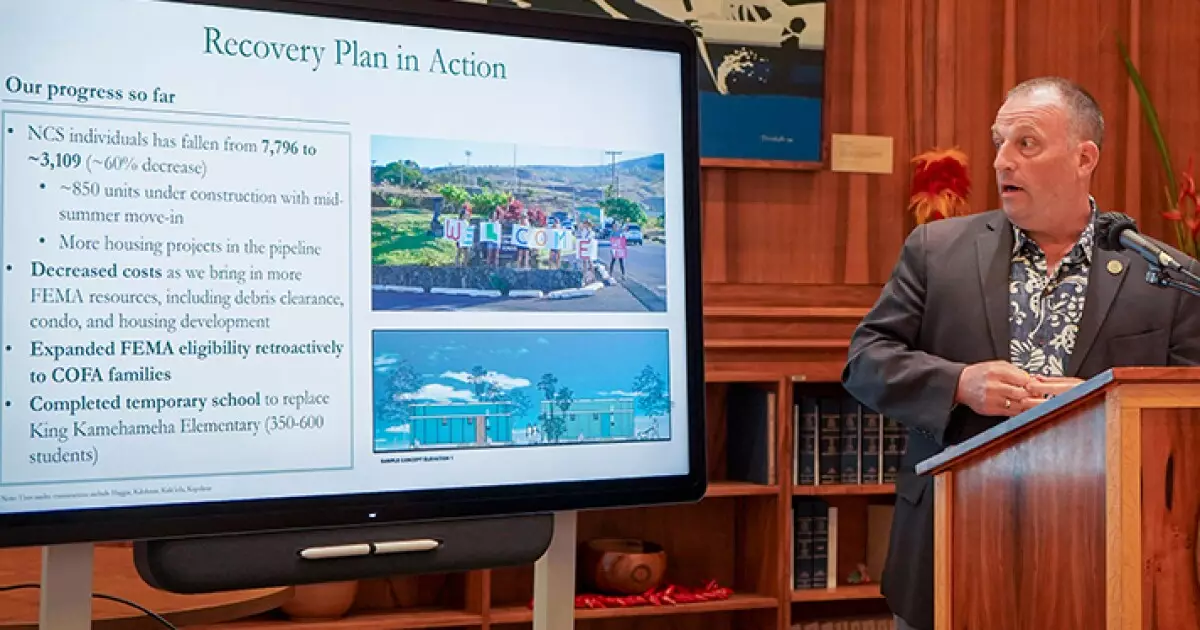Governor Josh Green of Hawaii has recently provided an update on the progress being made towards reducing recovery costs following the devastating Lahaina wildfires. One of the key strategies being implemented is to transition people who have been displaced by the fires out of temporary hotel accommodations and into permanent housing. This move is aimed at not only providing long-term stability for those affected by the wildfires but also at reducing the financial burden on the state in terms of recovery costs.
Despite the efforts being made by the state government, Governor Green has faced criticism from lawmakers for the lack of a comprehensive housing plan and a coherent budget to address the costs associated with the wildfires. Lawmakers are concerned that the recovery costs could potentially overshadow other budgetary priorities and impact the overall operations of state government. During a recent hearing, State Sen. Jarrett Keohokalole expressed the need for a clear understanding of the financial implications if the situation is not brought under control promptly.
To address the mounting costs of wildfire recovery, Hawaii Budget Director Luis Salaveria requested emergency funding from the Ways and Means Committee. This request sought to increase the available funds for wildfire recovery to $412 million for the current fiscal year. The Ways and Means Committee approved House Bill 679, which allocated emergency appropriations totaling $297 million for food, shelter, and support services in addition to the existing $200 million. The state has also signed a contract with the Red Cross amounting to $500 million to provide essential services to those impacted by the wildfires.
The state had initially anticipated that FEMA would cover a significant portion of the recovery costs, including housing expenses for those affected by the wildfires. However, FEMA has declined to reimburse housing costs for individuals who were already homeless or undocumented. Negotiations between the state and FEMA are ongoing, with the state striving to secure reimbursement for a growing number of individuals. The efforts have resulted in a reduction in the number of people residing in temporary hotels, with permanent housing being secured for the remaining individuals.
Governor Green emphasized the importance of finding long-term solutions to the housing crisis in Hawaii. He urged property owners violating short-term rental laws to collaborate with FEMA or the state for the next two years before selling to local families. The governor highlighted that rectifying the issue of illegal short-term rentals could significantly alleviate the state’s housing challenges. Despite the financial strain caused by the wildfires, Governor Green reassured that Hawaii’s finances are stable, and the state is not anticipated to dip into its rainy-day fund or cut essential services.
To offset some of the wildfire expenses, Governor Green proposed not making a planned $300 million payment to the Employment Retirement Services fund. He estimated a carryover balance ranging from $681 million to $981 million in fiscal year 2024 and $350 million to $650 million in fiscal year 2025. This decision aligns with efforts to prioritize investments in the community over additional contributions to the ERS fund. The state’s debt, pension, and OPEB liabilities are among the highest in the nation, posing long-term challenges to Hawaii’s credit profile.
Overall, Governor Green’s proactive approach towards addressing the wildfire recovery and housing issues in Hawaii demonstrates a commitment to finding sustainable solutions while ensuring financial stability for the state. By prioritizing permanent housing for those affected by the wildfires and exploring innovative strategies to address the housing crisis, Hawaii is taking significant steps towards recovery and resilience.

